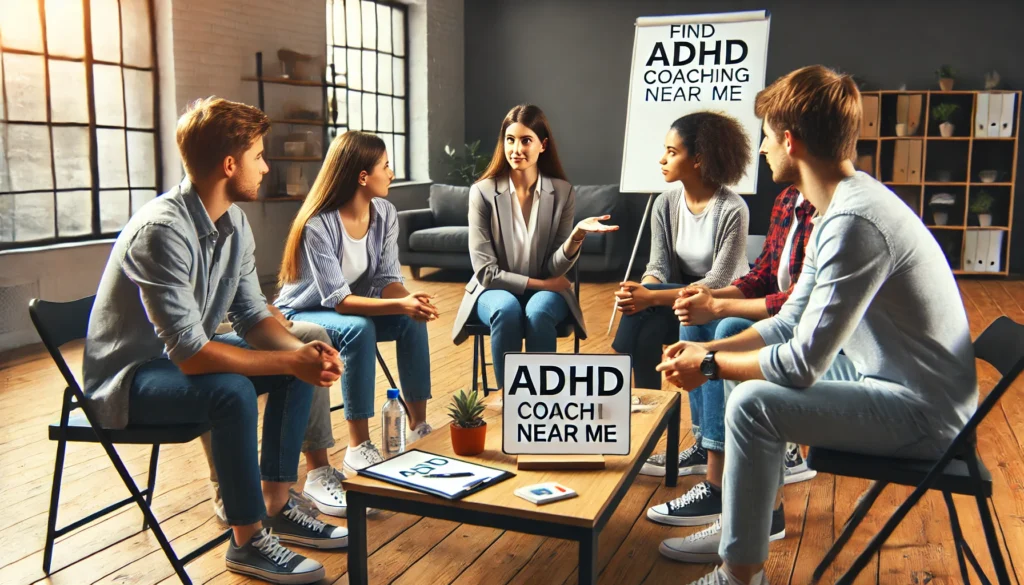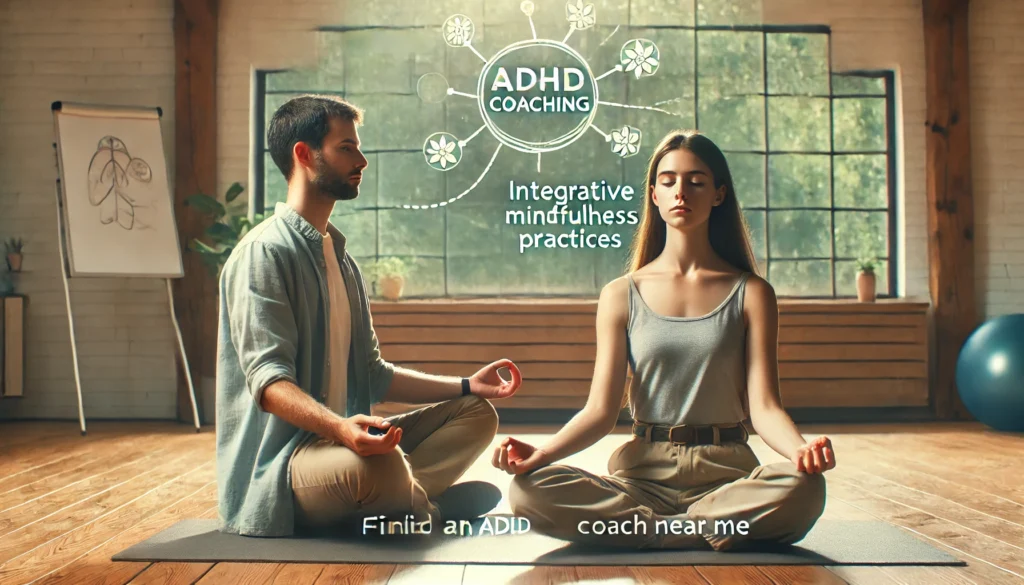ADHD coaching is a specialized form of life coaching designed to address the unique challenges faced by individuals with ADHD. These challenges often include issues related to time management, organization, goal-setting, and maintaining focus.
You may also like: Enhancing Concentration: Strategies for ADHD
The Role of an ADHD Coach
An ADHD coach works collaboratively with clients to develop personalized strategies that enhance executive functioning and improve daily living. This involves not only the practical aspects of managing tasks but also building self-awareness and fostering resilience. Coaches support clients in setting realistic goals, creating actionable plans, and developing skills to navigate the complexities of ADHD.
Building Self-Awareness
One of the initial steps in ADHD coaching is enhancing self-awareness. Coaches help clients identify their strengths and challenges, which is crucial for setting achievable goals. This process involves reflection and feedback, allowing clients to gain a clearer understanding of how ADHD affects their daily lives.
Fostering Resilience
Resilience is a key focus in ADHD coaching, enabling clients to bounce back from setbacks. Coaches use techniques such as cognitive restructuring and stress management to help clients build mental and emotional strength. This resilience not only aids in overcoming immediate challenges but also prepares clients for future obstacles.
Developing Executive Functioning
Improving executive functioning is a core objective in ADHD coaching. Coaches use a variety of strategies to enhance skills like planning, prioritization, and time management. These skills are foundational for academic, professional, and personal success, providing clients with tools to better organize their lives.
Benefits of Hiring an ADHD Coach
The advantages of engaging with an ADHD coach extend beyond symptom management. Here are some key benefits:
Improved Executive Functioning
ADHD coaches focus on improving executive functions, such as planning, prioritization, and impulse control. These skills are crucial for academic, professional, and personal success.
Planning and Organization
Effective planning and organization are often the first areas addressed in ADHD coaching. Coaches teach clients how to break tasks into manageable steps, use calendars effectively, and set realistic deadlines. This approach helps clients feel more in control of their schedules and reduces overwhelm.
Prioritization Techniques
Learning to prioritize tasks is essential for managing ADHD effectively. Coaches guide clients in distinguishing between urgent and important tasks, enabling them to allocate time and resources more efficiently. This skill helps prevent burnout and ensures that critical tasks are addressed promptly.
Impulse Control Strategies
Impulse control is a significant challenge for many with ADHD. Coaches employ techniques such as mindfulness and self-monitoring to help clients recognize and manage impulsive behaviors. These strategies lead to improved decision-making and more thoughtful responses to situations.
Enhanced Self-Esteem and Confidence
By achieving small, incremental goals, clients often experience a boost in self-esteem and confidence. This positive reinforcement encourages further progress and a more empowered outlook on life.
Celebrating Small Wins
Acknowledging and celebrating small achievements is vital in boosting self-esteem. Coaches emphasize the importance of recognizing progress, no matter how minor, to build motivation and confidence. This practice helps clients develop a more positive self-image and a can-do attitude.
Overcoming Negative Self-Talk
ADHD coaching often involves addressing negative self-talk that can undermine confidence. Coaches work with clients to identify and challenge negative beliefs, replacing them with positive affirmations. This shift in mindset supports a healthier, more optimistic self-view.
Empowerment Through Goal Achievement
Reaching goals, even small ones, can be incredibly empowering. Coaches help clients set attainable objectives and develop strategies to achieve them, reinforcing the belief that they can succeed. This empowerment fuels further efforts and a proactive approach to life’s challenges.
Personalized Support
ADHD coaching is highly individualized, taking into account the unique needs and circumstances of each client. This personalized approach ensures that strategies are relevant and effective.
Tailored Strategies
Every individual with ADHD is different, and coaching strategies reflect this diversity. Coaches develop customized plans that address each client’s specific challenges and strengths. This personalized attention increases the likelihood of success and sustained improvement.
Adaptable Techniques
As clients progress, their needs and challenges may change. ADHD coaches adapt their techniques to meet evolving circumstances, ensuring continued relevance and effectiveness. This adaptability keeps coaching sessions dynamic and responsive to the client’s journey.
Ongoing Feedback and Adjustment
Regular feedback is an integral part of ADHD coaching. Coaches provide constructive input and make adjustments to strategies based on the client’s experiences and progress. This iterative process ensures that coaching remains aligned with the client’s goals and needs.

How to Find the Right ADHD Coach Near You
Locating the right ADHD coach requires careful consideration and research. Here are some steps to guide you in your search:
Define Your Needs
Before you begin your search, it’s essential to clearly define what you are looking to achieve with an ADHD coach. Are you seeking help with organization, time management, or emotional regulation? Understanding your priorities will help you find a coach whose expertise aligns with your goals.
Identifying Key Challenges
Start by identifying the specific challenges you or your child face. Is it procrastination, difficulty in maintaining focus, or emotional outbursts? Having a clear understanding of these challenges will guide your search for a coach with the right expertise.
Setting Clear Objectives
Define what success looks like in your coaching relationship. Whether it’s achieving better grades, reducing stress, or improving work performance, having clear objectives helps in selecting a coach who can facilitate these outcomes.
Assessing Personal Preferences
Consider personal preferences that might affect your choice of coach. Do you prefer in-person sessions, or is virtual coaching more convenient? Are you looking for someone with a certain communication style? These preferences will narrow down your options.
Research and Referrals
Start by researching ADHD coaches in your area. Online directories, such as the ADHD Coaches Organization or the Attention Deficit Disorder Association, can be valuable resources. Additionally, seeking referrals from healthcare providers, support groups, or educational institutions can provide trusted recommendations.
Utilizing Online Resources
Leverage online directories and databases dedicated to ADHD coaching. These platforms provide detailed information about coaches’ qualifications, areas of expertise, and client reviews, helping you make an informed choice.
Seeking Professional Recommendations
Consult healthcare providers or therapists who may have insights into reputable ADHD coaches. Their professional networks can lead to trustworthy referrals, ensuring that you connect with a coach recognized for quality service.
Engaging with Support Communities
Join ADHD support groups or forums where members share experiences and recommendations. These communities can offer firsthand accounts of coaching experiences, guiding you toward reputable professionals.
Evaluate Credentials and Experience
When selecting an ADHD coach, evaluate their credentials and experience. Look for coaches who have received specialized training in ADHD coaching and hold relevant certifications. Experience working with clients similar to your demographic (e.g., children, adults, or executives) can also be a crucial factor.
Checking Certifications
Ensure the coach holds certifications from recognized organizations, indicating they have undergone rigorous training. Certifications demonstrate a commitment to maintaining high standards in ADHD coaching.
Reviewing Professional Experience
Consider the coach’s experience with clients who have similar needs. A coach with a track record of success in your specific area of concern is more likely to provide effective guidance.
Assessing Continued Education
Coaching techniques and ADHD research are continually evolving. Coaches who engage in ongoing education and professional development are better equipped to offer current and effective strategies.
Interview Potential Coaches
Conduct interviews with potential coaches to assess their approach and compatibility with your needs. Inquire about their coaching style, methodologies, and success stories. This conversation is an opportunity to gauge their understanding of ADHD and their ability to tailor strategies to your specific challenges.
Discussing Coaching Methodologies
Ask about the coach’s preferred methodologies and how they tailor these to individual clients. Understanding their approach will help you determine if it aligns with your expectations and needs.
Exploring Success Stories
Request examples of past successes with clients facing similar challenges. Hearing about tangible outcomes and improvements can provide confidence in the coach’s ability to deliver results.
Assessing Communication Style
Effective communication is key to a successful coaching relationship. Evaluate the coach’s communication style during the interview to ensure it resonates with you or your child. A compatible style fosters a positive and productive coaching experience.

Current Trends in ADHD Coaching
The landscape of ADHD coaching is continually evolving, influenced by advancements in research and technology. Some current trends include:
Virtual Coaching
The rise of digital communication platforms has made virtual coaching a popular option. This mode of coaching offers flexibility and accessibility, enabling clients to connect with coaches from anywhere in the world.
Benefits of Virtual Coaching
Virtual coaching provides unparalleled convenience, allowing sessions to be scheduled without geographical constraints. This flexibility is particularly beneficial for clients with busy schedules or those living in remote areas.
Overcoming Barriers
Virtual coaching removes barriers such as travel time and location limitations. It also offers a comfortable environment for clients who may feel more at ease discussing personal topics from their own space.
Maintaining Engagement
Despite the physical distance, virtual coaching maintains high levels of engagement through interactive tools and regular communication. Coaches employ technology to create immersive and effective coaching experiences.
Integrative Approaches
Many ADHD coaches now incorporate integrative approaches that blend traditional coaching techniques with mindfulness practices, nutritional guidance, and cognitive behavioral strategies. This holistic approach can enhance overall well-being and effectiveness.
Mindfulness Practices
Mindfulness practices are increasingly used in ADHD coaching to improve focus and emotional regulation. Techniques such as meditation and breathing exercises help clients develop greater attention control and stress management skills.
Nutritional Guidance
Diet and nutrition can significantly impact ADHD symptoms. Some coaches provide guidance on dietary choices that support cognitive function and emotional stability, complementing other coaching strategies.
Cognitive Behavioral Strategies
Cognitive Behavioral Therapy (CBT) strategies are integrated into coaching to address negative thought patterns and behaviors. These strategies promote positive change and empower clients to manage their ADHD more effectively.
Focus on Neurodiversity
Increasingly, ADHD coaches are adopting a neurodiversity perspective, recognizing ADHD as a natural variation in human cognition rather than a disorder to be “fixed.” This shift emphasizes leveraging individual strengths and fostering an inclusive mindset.
Embracing Individual Strengths
The neurodiversity approach encourages coaches to focus on clients’ unique strengths rather than solely on challenges. This perspective fosters a sense of pride and acceptance, motivating clients to leverage their abilities.
Promoting Inclusivity
Coaches adopting a neurodiversity mindset advocate for inclusivity and understanding of cognitive differences. This approach reduces stigma and promotes a supportive environment for clients to thrive.
Shifting Perspectives
Recognizing ADHD as a natural variation reshapes how clients view themselves, encouraging self-acceptance and reducing feelings of inadequacy. This shift in perspective can lead to improved mental health and well-being.

Future Implications of ADHD Coaching
As our understanding of ADHD continues to deepen, the role of coaching is poised to expand. Future implications may include:
Enhanced Collaboration with Healthcare Providers
ADHD coaches may increasingly collaborate with healthcare providers, such as psychiatrists and therapists, to provide comprehensive care. This collaboration can lead to more cohesive treatment plans and improved outcomes for clients.
Integrated Care Models
Future ADHD coaching may involve integrated care models where coaches work alongside medical professionals to create holistic treatment plans. This collaboration ensures that all aspects of a client’s needs are addressed.
Shared Insights and Expertise
Collaboration allows for the exchange of insights and expertise between coaches and healthcare providers. This synergy enhances the quality of care and provides clients with a more well-rounded support system.
Improved Client Outcomes
Through collaborative efforts, clients receive more comprehensive and effective support, leading to better outcomes in managing ADHD symptoms and achieving personal goals.
Technological Innovations
Emerging technologies, such as artificial intelligence and virtual reality, hold the potential to revolutionize ADHD coaching. These tools may offer new ways to engage clients, track progress, and personalize coaching strategies.
Artificial Intelligence in Coaching
AI can analyze client data to provide insights into behavioral patterns and suggest personalized strategies. This technology enables coaches to offer highly targeted and effective interventions.
Virtual Reality Applications
Virtual reality offers immersive experiences that can enhance focus and practice real-life scenarios. This technology provides clients with innovative ways to develop skills and improve executive functioning.
Data-Driven Progress Tracking
Technological tools allow for precise tracking of client progress and adjustment of strategies. Data-driven insights enable coaches to make informed decisions and optimize coaching effectiveness.
Greater Accessibility and Acceptance
As awareness of ADHD and its impact grows, ADHD coaching is likely to become more widely accepted and accessible. This increased recognition can lead to broader insurance coverage and more opportunities for individuals to benefit from coaching services.
Expanding Insurance Coverage
As ADHD coaching gains recognition, insurance companies may begin to cover coaching services. This coverage would make coaching more accessible to a broader audience, reducing financial barriers.
Increasing Public Awareness
Public awareness campaigns can highlight the benefits of ADHD coaching, fostering greater acceptance and understanding. This shift in perception encourages more individuals to seek coaching as a viable support option.
Broadening Access to Coaching
With increased acceptance and insurance coverage, ADHD coaching can reach a more diverse audience. This accessibility ensures that individuals from various backgrounds can benefit from coaching services.
Conclusion
Finding the right ADHD coach locally involves a thoughtful and informed approach. By understanding the role and benefits of coaching, conducting thorough research, and staying attuned to current trends, you can make an informed decision that supports your journey toward greater focus, organization, and self-confidence. Whether you seek a coach for yourself or a loved one, the right partnership can be a catalyst for positive change and personal growth. With the evolving landscape of ADHD coaching, the future holds exciting possibilities for enhancing the support and empowerment available to those navigating the challenges of ADHD.
Further Reading:
Do you (or someone you care about) have ADD or ADHD?
Important Note: The information contained in this article is for general informational purposes only, and should not be construed as health or medical advice, nor is it intended to diagnose, prevent, treat, or cure any disease or health condition. Before embarking on any diet, fitness regimen, or program of nutritional supplementation, it is advisable to consult your healthcare professional in order to determine its safety and probable efficacy in terms of your individual state of health.
Regarding Nutritional Supplements Or Other Non-Prescription Health Products: If any nutritional supplements or other non-prescription health products are mentioned in the foregoing article, any claims or statements made about them have not been evaluated by the U.S. Food and Drug Administration, and such nutritional supplements or other health products are not intended to diagnose, treat, cure, or prevent any disease.


